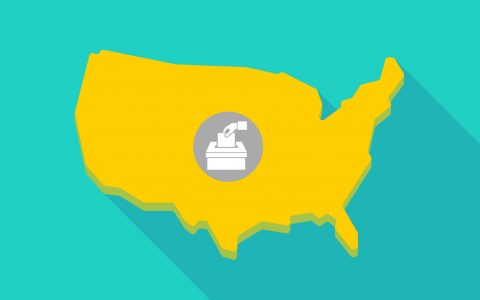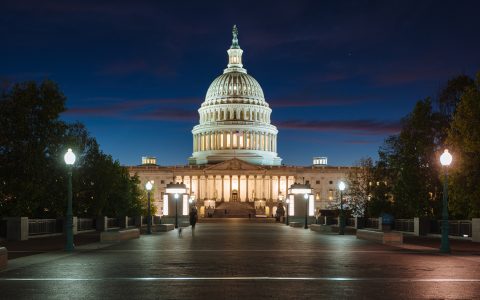Welcome to Leafly’s live coverage of the 2018 Midterm Elections. With cannabis reform measures on the ballot in four states, this election could mark another moment of progress for the legalization movement.
Leafly will be updating this page with as-they-happen results, dispatches from correspondents across the country, and commentary from around the cannabis community (all times are Pacific Standard Time). We’ll also be providing regular video updates from Leafly HQ on Periscope and Facebook Live.
Races We’re Watching on Tuesday
Cannabis legalization goes before the voters in a number of states on Nov. 6. This year’s highlights:
- Michigan and North Dakota will decide statewide measures on the legalization of adult-use cannabis.
- Utah and Missouri will consider medical marijuana legalization initiatives.
- Local municipalities in California are considering a ton of cannabis tax-and-zoning measures.
- Other states will consider smaller reforms or advisory measures, including Ohio and Wisconsin.
- Several Congressional races critical to cannabis reform are neck-and-neck, including seats belonging to Rep. Dana Rohrabacher (R-Calif., pro-legalization) and Rep. Pete Sessions (R-Texas, anti-medical cannabis).
States in Play: November 2018
Adult Use
Medical
Local Decriminalization
| Location | Ballot Measure | What It Affects | Status |
|---|---|---|---|
| Dayton, Ohio | Advisory measure | City of Dayton | Non-binding advisory vote: If passed, it would still take a city commission vote to amend city ordinances |
| Ohio | State Issue 1 | Entire state of Ohio | Measure would reduce felony drug & paraphernalia possession to misdemeanors |
| Wisconsin | County-by-County Advisory Referendums | 16 of Wisconsin’s 72 counties | 16 counties will vote on cannabis policy. Some on medical, some on adult use. All will be non-binding, advisory votes only. |
Key Congressional Races
House of Representatives
Cannabis legalization could get a big boost if Democrats take control of the House of Representatives on Tuesday—at least according to US Rep. Earl Blumenauer (D-OR), the founder of the Congressional Cannabis Caucus. He’s laid out a month-by-month plan for how Democrats could finally take dismantle federal prohibition. “Congress is out of step with the American people and the states on cannabis,” Blumenauer wrote last month in a memo to Democratic leadership, noting that two-thirds of Americans support legalization. “We have an opportunity to correct course if Democrats win big in November.”
If Democrats take control of the House, Blumenauer said, congressional committees during the first quarter of 2019 would hold hearings on matters like descheduling, scientific research, and financial services for growers and entrepreneurs. By the second quarter of 2019, lawmakers would begin marking up already-introduced legislation in order to combine them into a single cannabis package that narrows the gap between state and federal law. The House would aim to pass the full package by Congress’s annual recess in August, then work with allies to push the bill through the Senate. “Our chances in the Senate depend on both the November elections and increased public pressure following House passage,” Blumenauer wrote.
Rep. Dana Rohrabacher (R-California, 48th District)
Rohrabacher, an old-school Republican conservative, has been one of the staunchest advocates for cannabis legalization in Congress over the past decade. He’s also a conservative in a district whose demographics have been changing. Once solidly red-Republican, the Orange County seat is now purple. Hilary Clinton won it by two points in 2016.
Rohrabacher now faces Harley Rouda, a former Republican who acted on his Never Trump instincts to switch parties. He’s now in a tight race that’s coming down to the wire.
This one has some legalization advocates torn: Rep. Dana Rohrabacher, longtime cannabis champion, is in a near dead heat on election eve. His opponent, a Democrat, would probably vote for legalization but wouldn’t be the rock Rohrabacher has been. https://t.co/lhscuLGArS
— The Roll-Up (@TheRollUp) November 5, 2018
Rep. Pete Sessions (R-Texas, 32nd District)
Sessions, no relation to the US Attorney General Jeff Sessions, is the longtime Congress member from the Dallas suburbs and his seat would be of no interest to us but for one thing: Sessions adamantly refused to allow the Rohrabacher-Blumenauer Amendment, the budgetary measure that is the sole federal protection for medical cannabis patients nationwide, to move through his committee. Why? Presumably he thinks medical cannabis patients are all a bunch of stoners.
Sessions may be one of the last men in America to think this way. But because he’s a House committee chair, he’s in a unique position of power and has used it to put the health of millions of cannabis patients at risk.
For the first time in many, many years, Sessions finds himself training on election eve:
.@UpshotNYT has @ColinAllredTX up by 4 over @PeteSessions. Not great for an 11-term incumbent to be polling 42% with two days to go https://t.co/yEDJ0hQ8l4 #tx32 #tx2018 pic.twitter.com/FgZQrteoV4
— Evan Smith (@evanasmith) November 5, 2018
On Election Eve, John Boehner Says ‘Legalize It.’
11:21 AM PST SAN FRANCISCO—My, what a long strange trip it’s been for John Boehner.
The Republican ex-speaker of the House of Representatives just penned an editorial for the Wall Street Journal arguing to ‘legalize it,’ Peter Tosh style.
In an opinion article, ‘Washington Needs to Legalize Cannabis,’ Boehner recounts how reports from friends and loved ones about the relief they found with medical cannabis helped change his mind on the issue. Nine have spoken on recreational use, Boehner notes, and cannabis could help blunt the damage of America’s opioid epidemic. He invoked the 10th Amendment and the threat of a liberal “nanny state,” and called for the rescheduling of cannabis, which is currently treated like heroin by the federal government.
Boehner embraced his own ability to evolve. “Representatives must use the what the people tell them,” he wrote, “to question constantly which policies are serving the greater good.”
He noted, “government works best when it listens to its constituency.”
Critics note Boehner seems to work best when he’s got skin in the game. The Journal article carried no disclosure noting that Boehner joined cannabis company Acreage Holdings in April. That’s a pretty serious turnaround for the Ohio Republican who served as a US representative from 1991-2015, the peak of mass incarceration in America.
—David Downs
How’d They Vote on Cannabis?
12:45 P.M. PST, SAN FRANCISCO—How would know if your local representative in Congress cast terrible votes on cannabis? The Cannabis Voter Project kept the receipts.
The online voter education tool made a last-minute push to educate single-issue voters Monday, using celebrities to encourage voters to look up and potentially vote out representatives who were awful on drug reform.
The web site experience is slick. You click on your state—like California—on the home page map and it populates with “Where Do California’s Senators Stand?” The site also lists all your state’s Congressional representatives.
Representatives like Rep. Devin Nunes (R—Fresno) have a score of zero out of seven, meaning Rep. Nunes did not support any key Congressional cannabis law reform bills.
By contrast, Republican Rep. Dana Rohrabacher of Huntington Beach has a stellar 7-0 record on cannabis.
In another closely watched California race, Rep. Darrell Issa has the opposite—a 0-7 cannabis voter score, including a “D” grade from NORML.
Cannabis Voter Project comes from HeadCount.org, a non-partisan group aiming to educate Americans about how voting counts. Since 2004, HeadCount helped register nearly 500,000 people to vote at more than 1,000 live music events each year, including tours by Dead & Company, Phish, G-Eazy, Paramore, and Dave Matthews Band.
Do you know where your elected officials stand on cannabis? @Cannabis_Voter Project will help you get informed. Check them out at https://t.co/7hvC3zwCpN and don’t forget to VOTE tomorrow 11/6! pic.twitter.com/G0TRV8tDXU
— 311 (@311) November 5, 2018
And you know the band Lettuce is all about it.
Do you know where your elected officials stand on cannabis? We’re getting behind @HeadCountOrg and its @Cannabis_Voter Project to help you get informed. Checkout https://t.co/lpjiisfHjD and then VOTE! pic.twitter.com/sFj9lR6BmW
— Lettuce (@lettucefunk) November 1, 2018
—David Downs



